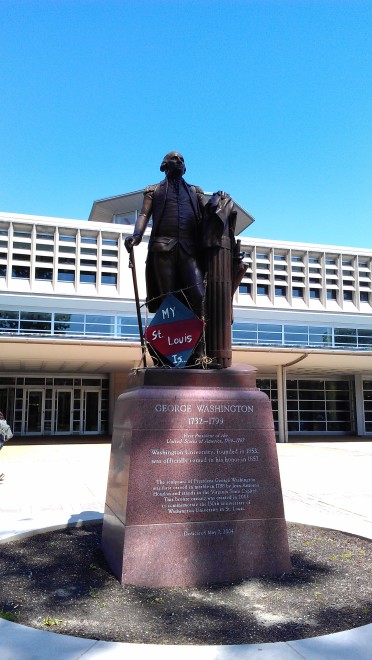Missouri Compromised
George Washington wielded uncommon influence by seeming to transcend politics. John Adams nominated him to lead the Continental Army, seeing him as the unifying figure that could turn the thirteen colonies into the United States of America. During his presidency he warned of the toxic effect that political parties would have on American government, a prescient forecast for the future of the American republic. When it came time to rename the Eliot Seminary in 1857, few names were safer than that of our first president, a proud Virginian who fought to create the Union that was now coming apart at the seams. The culture of avoiding conflict has endured on Washington University’s campus—a result of a unique cocktail of geographic and political factors.
When pitted against its eastern Ivy League cousins, Midwestern Washington University carries a natural chip on its shoulder. Founded 217 years after Harvard, Washington University could never become an “establishment” institution capable of pumping out senators and cabinet secretaries with an alarmingly high frequency. Former Secretary of Defense Clark Clifford, Washington University’s most well known political alumnus, rose to national prominence on the coattails of fellow Missourian President Harry Truman. Their eastern counterparts viewed both with derision for their simple Midwestern roots.
 Even when compared to its two Midwestern rivals, Northwestern and the University of Chicago, Washington University is dwarfed in political stature. The University of Chicago Economics Department played a key role in Ronald Reagan’s presidency with Nobel Laureate Milton Friedman serving on the Council of Economic Advisors. “The Chicago School” of economics also gained its fair share of notoriety for its role in advising Augusto Pinochet, the longtime derechista dictator of Chile. Northwestern can currently claim Attorney General Eric Holder as an esteemed law school graduate; and President Obama spent years teaching at University of Chicago Law School.
Even when compared to its two Midwestern rivals, Northwestern and the University of Chicago, Washington University is dwarfed in political stature. The University of Chicago Economics Department played a key role in Ronald Reagan’s presidency with Nobel Laureate Milton Friedman serving on the Council of Economic Advisors. “The Chicago School” of economics also gained its fair share of notoriety for its role in advising Augusto Pinochet, the longtime derechista dictator of Chile. Northwestern can currently claim Attorney General Eric Holder as an esteemed law school graduate; and President Obama spent years teaching at University of Chicago Law School.
Still, Washington University is at the very least the academic behemoth in Missouri politics. Former Missouri senators John Danforth and Jim Talent both have roots on campus (though Danforth never attended as a student). Missouri political clout grows on the walls here, with names like Crow (a former senator), Danforth, and Gephardt (a former House Minority Leader) adorning buildings across campus. But compared to institutions producing US presidents, these names are small potatoes. While famous alumni comprise only a part of a university’s political reputation, Washington University still lags behind in a highly visible arena.
Somewhat incongruously, U.S. News and World Report consistently ranks our political science highly among political science departments nationally. The story here is in the details. Though the department holds the quite respectable rank of 15th for American politics, they shoot up the list to 7th for political methodology. Mirroring its other strengths, Washington University finds its political prowess in the scientific analysis of politics more than its execution. Analysis rarely makes headlines, even if it provides the backbone of a story.
Washington University’s climb in the national rankings has been rapid, and many on campus hope the ultimate summit remains in the distance. In many ways, Washington University stands out as the Brazil of American academia. Overcoming the tumultuous decades of the sixties and seventies [think of the burning of the ROTC building and the destruction of the sociology department], Brazil has capitalized on particular drivers of growth [think of the university’s love affair with Biomedical Engineering] to assume a role as one of the top developing nations [universities] in the world. Brazil shrugs off many of the political pressures considered by European nations and the US, preferring to let commerce dictate foreign policy.
While eastern universities often serve as staging grounds for major political and ideological battles, Washington University remains focused on reputation growth and the hard sciences, putting off political affairs for future generations. We seem to have flipped the words of John Adams: “I must study politics and war that my sons may have liberty to study mathematics and philosophy.”
With increased admissions selectivity, a growing endowment, and wider name recognition, Washington University will gradually develop as a politically conscious and active institution. The eastern establishment has faded, and the well-heeled men from New York and Boston no longer have exclusive control over the pipeline to Wall Street and Pennsylvania Avenue. Washington University will have its cabinet secretaries—just as soon as it has its engineers.